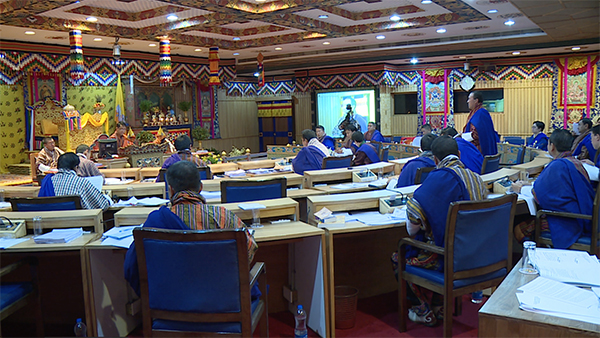 The National Council ratified the Multilateral Agreement for the Establishment of an International Think Tank for the Landlocked Developing Countries. Council’s foreign relations committee saw there is not much negative impact to Bhutan and recommended the house to ratify the agreement.
The National Council ratified the Multilateral Agreement for the Establishment of an International Think Tank for the Landlocked Developing Countries. Council’s foreign relations committee saw there is not much negative impact to Bhutan and recommended the house to ratify the agreement.
The Foreign Minister, Damcho Dorji, introduced the agreement to the National Council today. He said the agreement will benefit member countries in terms of sharing ideas and expertise for development.
If Bhutan becomes a member of the International Think Tank, the country can look at exchange of scholars and researchers between the member countries and national organisations such as Centre for Bhutan Studies, and GNH Research and the Royal Institute for Governance and Strategic Studies (RIGSS).
But few members raised questions on the trade benefit and financial implications of joining the think tank.
“The biggest trade relation we have today is with India and Bangladesh. But these two countries are not included in the 31 member countries. So what implications and benefits can our signing the agreement have for the country? So if minister can tell us the advantages and disadvantages of signing the agreement without these two countries as members,” said National Council member from Trongsa, Tharchen.
“It is evident that we will benefit us, but before signing the agreement it is important for us to know the financial implications of joining the Think Tank,” said Pema Gatshel’s National Council Member, Jigme Rinzin.
To this the Foreign Minister said that since all the members are least developed countries, it will help them develop interdependently.
“For an instance, not just our country, but if there is supporter for Mongolia, it will benefit rest of the countries as well. Since it is of collective bargaining, we will benefit. The 32 countries have problems in term of development. But there are countries that depend on them. For an instance, if Bangladesh need to trade with China, they have to do that via our territory. So everything is interdependent. We cannot work independently. And if we have good relation with neighboring countries, it will benefit everyone,” added the minister.
All the twenty-one members present during the session voted in favor of signing the agreement. The agreement will be submitted to His Majesty The King for Royal assent. The Agreement was ratified by the National Assembly during its 9th session and was forwarded to the national council.
The think tank was established by nine landlocked countries in 2003. Its aim is to bring about development and reduce poverty in these developing nations. The Mongolian government had approached Bhutan to join the Think Tank last year.









